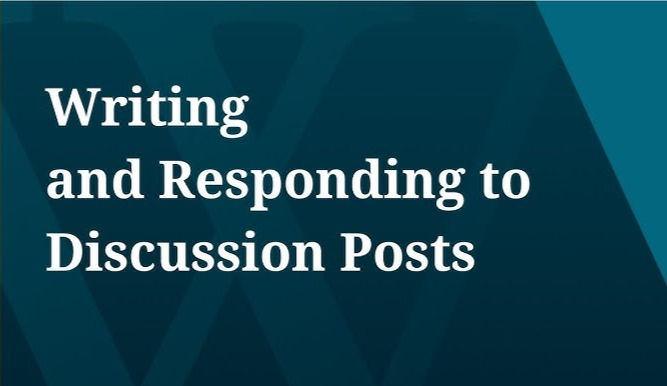A DISCUSSION POST: WHAT IS IT?
- Wayne Kisanyanya
- Jan 25, 2024
- 5 min read
A discussion post is a brief written assignment in which you are usually required to write an online message board reflection on a specified issue or the readings for the week. Although they are occasionally used in in-person lectures, discussion threads are mostly employed in virtual learning environments. In an in-person class, if you are asked to submit a discussion post, you usually print it out, put it in front of the teacher with your name, student number, and references to the instructor. Requirements are usually less formal when creating a discussion post for online submission. In any case, a discussion post usually needs you to write a brief essay demonstrating your comprehension of the subject matter by responding to it personally or by citing a reliable academic source.
In light of this, creating a discussion piece can be simple if you make sure you comprehend the content you are writing in response to. You might want to read the discussion posts made by other students before writing your own if you don't have time to read the material that was assigned to you. If your classmates are correct, you can exclude a significant portion of the reading that was assigned to you by rephrasing their analyses of the readings or text while adding small adjustments. Though it can be obvious, this is an excellent method for last-minute discussion post posting. Therefore, it is preferable for you to study the assigned readings and finish your discussion post independently of your classmates' work.

You may then be asked to reply to contributions made by your classmates in certain discussion threads. Although it can be a laborious procedure, it is not inherently challenging. To participate with at least one point of what your fellow course participants are discussing, all you have to do is skim or read the other posts and apply your critical thinking skills or the reading comprehension you have already acquired. In essence, these responses entail taking one of your peers' points and expressing agreement or disagreement with them. Don't just say that you thought their piece was excellent. When responding to a discussion post, you can be succinct, but you must at least explain your position.
A discussion post's primary goal is to address the readings or in-class content that have been assigned for the week. If your class requires discussion posts, you will typically need to write and turn them in once a week. This serves as a means for the instructor or professor to ensure that you are adhering to the assigned readings and other course materials. Even while the number of discussion posts you submit might not matter significantly to your final grade, skipping discussion posts increases the likelihood that you will receive a low mark in the class or even unwelcome attention from your professor or teacher.
SUMMARY OF A DISCUSSION POST TO WRITE
Making sure you grasp the subject matter at least somewhat is the first and most crucial step in creating a discussion post. Writing a discussion post entails analyzing the provided topic critically utilizing an external academic reference, or it can involve expressing your personal thoughts about it. In any case, in order to produce a discussion post that is well-organized, successful, and likely to earn you full credit for your effort, you must be aware of the topic you are writing about.
You should go into more detail about the angle you have selected in connection to the text as you write your discussion post. Since the majority of discussion posts are between 150 and 500 words long, you should make an effort to use succinct language. The particular section of the given content that you will be working with is represented by an angle. Focusing on a tiny portion of the reading will make it much easier for you to produce a discussion post because it will need less effort on your part. Additionally, your professor or teacher will believe that you have understood the reading if you are able to focus in on and write about a single detail from a reading or other piece of content. When writing a discussion post, this will significantly boost your chances of receiving an excellent mark.
A good rule of thumb is to avoid being unduly critical of your classmates' discussion posts while responding to them. Even though you may disagree with what they are saying, make sure to express it politely. If not, the student might challenge you in a subsequent discussion post, in which case you would have to stand by your own assertions. The primary goal of responding to a fellow student's discussion post is to demonstrate to your instructor or professor that you have read the material and have thought about it without adding to your own workload. Feel free to correct someone if you genuinely disagree with them and believe that you must convince them of their error. Having said that, you will ultimately end up with extra work on your plate if you criticize another student's post harshly. In responding to your students' remarks on a discussion board, you would be far better off voicing your political disagreement than participating in what is known as "trolling" on social media.
Ultimately, particularly given the prevalence of discussion postings in online courses, you have to realize that they are essentially just busywork for the majority of teachers. Your lecturer will probably skim rather than thoroughly read the discussion thread you submitted and provide a pass/fail grade. This is more likely to be the case in larger class sizes. Your professor might not even glance at your discussion post in certain very huge online classrooms, and you might get the necessary points just by posting it. However, online graduate programs leading to master's and doctoral degrees are not covered by this advise. Your professor will probably take online discussion posts significantly more seriously in a graduate school than in an undergraduate one because student conversation is one of the primary ways that learning is accomplished in these programs.
FORMULATING A DISCUSSION POST:
Posts in discussions typically have a relatively casual format. Write them like any other paragraph, since they are primarily meant to be posted on online course message boards. Generally, you can utilize the first person. It is nevertheless advised that you review your writing to make sure that there are no typos or grammatical errors. If your professor has requested that you include and include a source into your discussion post, please do so in order to get full credit. On the other hand, if you are turning in a paper discussion post, make sure that it includes your name, contact details, a title, and official citations for all the references you consulted.
WHAT MAKES A RESPONSE PAPER DIFFERENT FROM A DISCUSSION POST?
A discussion post and a response paper differ primarily in that the former is shorter and does not provide a thorough analysis of the subject matter being discussed. Discussion posts are usually weekly assignments that count toward a small amount of your grade, although both discussion posts and reaction papers will require you to share your thoughts on the content being studied. A response paper, on the other hand, is usually significantly lengthier, requires actual formatting outside of the online discussion board environment, and counts toward a larger percentage of your final mark. Therefore, a discussion post is a less significant kind of assignment than a response paper, but it still has many of the same requirements, such as being scored based on how well you can articulate your grasp of the given subject.


Comments